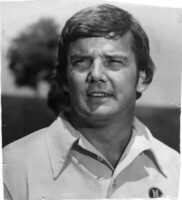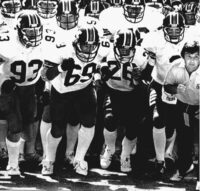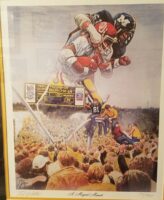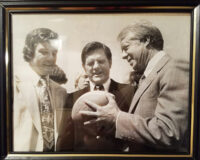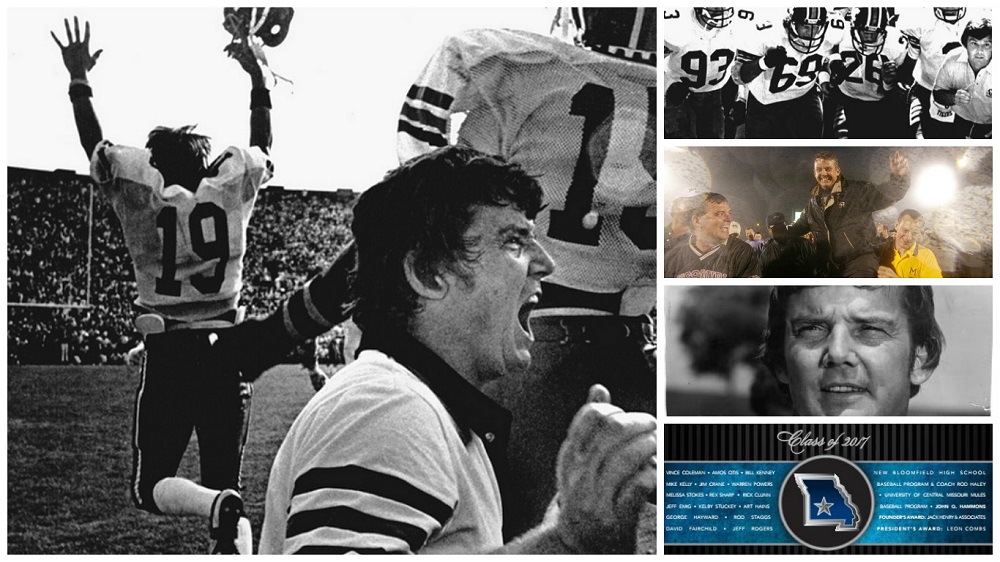Inductees
Warren Powers

February 19, 1941—November 2, 2021
The call came in after his first season as a head coach of a major college football program out West. On the other end of the line was the University of Missouri athletic director and a job offer to, in essence, come back home.
For Warren Powers, who grew up in Kansas City and had just led the Washington State Cougars to a 7-4 season in 1977, emotions were all over the map.
“Anytime you have an opportunity to go back home, it makes a difference,” Powers said. “No. 1, when I went out to Washington, that was the biggest job I had had. So it was a sleepless night.”
Powers soon re-awakened the Missouri Tigers, turning the program into a winner, and built on his own legacy – a legacy rooted as a standout player for the Nebraska Cornhuskers and the then-American Football League’s Oakland Raiders.
What a career it was, and the Missouri Sports Hall of Fame proudly inducted Powers with the Class of 2017.
At Mizzou, Powers was 46-33-3. That included trips to five bowl games as well as four wins against the rival Kansas Jayhawks, two against mighty Oklahoma and a 1978 victory against Nebraska – the Tigers’ last win against the Cornhuskers until 2003.
“When I went down to Missouri, I was familiar with the state,” Powers said. “I knew we had to go and get the recruits. I knew Missouri had a good name, but it was going to take something to convince Missouri players to stay in Missouri.”
Powers arguably made his case in his first game at Mizzou, a 3-0 victory at No. 5-ranked and defending national champion Notre Dame, quarterbacked then by future NFL legend Joe Montana. Notre Dame hadn’t been shut out since 1960.
“To go back and open up for your home state and then to beat Notre Dame, that was one of those things where you pinch yourself to make sure it really happened,” Powers said.
The 1978 team won the Liberty Bowl against Louisiana State, 20-15, and finished 15th in the Associated Press Top 25 poll. The Tigers reached bowl games again in 1979 (beating South Carolina in the Hall of Fame Bowl), 1980 (losing to Purdue in the Liberty Bowl), 1981 (beating Southern Mississippi in the Tangerine Bowl) and 1983 (losing to Brigham Young in the Holiday Bowl).
That Powers had climbed to such successful heights was remarkable, given a challenging childhood. You see, his mother passed away at a young age, leaving Powers, then age 7, and his five siblings (ages 16 to 2) mostly to raise themselves at a time when their dad regularly was gone to work.
Fortunately, Powers found a sports mentor in Joe Minter, the football coach at Kansas City’s Lillis High School.
“He was a big part of me going to Nebraska,” Powers said. “He did a good job. That was my biggest break, having a guy like that believe in you. He felt I could make it.”
Powers graduated in 1958 and then became a three-year letterman at Nebraska from 1960 to 1962. He went on to play six seasons (1963 to 1968) for the Oakland Raiders when the franchise was still in the American Football League. Playing safety, Powers had 22 career interceptions. He helped the Raiders win the AFL in 1967 and reach the second-ever Super Bowl in January 1968 before losing to the defending champion Green Bay Packers.
From there, he returned to assist Nebraska football for eight seasons – first for coach Bob Devaney and then for coach Tom Osborne – and paved the way toward his own head coaching career. When he went to Washington State, the Cougars actually opened the season in Lincoln, Neb., and beat the 15th-ranked Cornhuskers, 19-10.
“It was a devastating loss to Nebraska and, as we are leaving and we flew over the stadium, I turn to Warren and I said, ‘Thank God we never have to come back here again,’” said Linda Powers, the coach’s wife.
With Powers taking the Mizzou job a few months later, they were back in Lincoln at the end of the 1978 season – and beat the Huskers with the Tigers. That was the first of three great years from Mizzou quarterback Phil Bradley. It also marked the start of a great run for Powers.
“More than football, I admired my players and enjoyed watching them grow into responsible young men,” Powers said. “I wanted them to succeed as football players but, more importantly, in life.”
